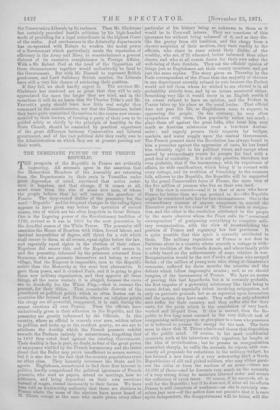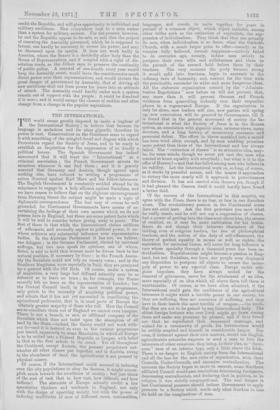THE IMMEDIATE FUTURE OF THE FRENCH REPUBLIC.
THE prospects of the Republic in France are evidently improving. All accounts agree in the assertion that the Monarchist Members of the Assembly are returning from the Departments to their seats in Versailles under great depression of mind, convinced that active resist- ance is hopeless, and that change, if it comes at all, must come from the rise of some now man, of whom the people believe that he will restore the grandeur of France. The deep-rooted dislike of the peasantry for the word " Republic " and for frequent changes in the ruling figure appears to have given way before the operation of several causes, two of which are too often forgotten in Great Britain. One is the lingering power of the Revolutionary tradition of 1789, revived. as it was in 1816 for the next generation by the dreadful scenes of the White Terror. The peasantry still associate the House of Bourbon with tithes, forced. labour, and insolent inequalities of degree, still thirst for a rule which shall secure to them, at all events, equal rights before the law, and. especially equal rights in the election of their rulers. Napoleon did secure this, and. the Republic will secure it, and the peasantry, informed by the prisoners returned from Germany, who are peasants themselves and belong to every village, that the Emperor is impossible, turn to the Republic rather than the Monarchy as the next best alternative. It gave them peace, and it crushed Paris, and it is going to give them new military organization, and they approve all those things, all the more warmly, it is alleged, because the curds are so decidedly for the White Flag,—that is, reasons the peasant, for their tithes. That remarkable distrust of the priesthood on political points which so often flashes out in countries like Ireland and Bavaria, where on religious points the clergy are all-powerful, reappeared, it is said, during the
recent elections all over France. Then the officials have undoubtedly given in their adhesion to the Republic, and the peasantry are greatly influenced by the Officials. In this country, where an official is scarcely ever seen, seldom mixes in politics, and. looks up to the resident gentry, we are ant to attribute the docility which the French peasants exhibit towards the Prefects entirely to subservience, forgetting that in 1819 they voted dead against the existing Government. Their docility is due in part, no doubt, to fear of the great power of annoyance wielded by the French bureaucracy and the latent dread that the Ballot may prove insufficient to secure secrecy, but it is also due to the fact that the country populations trust am other class. They honestly reverence the State and its agents. Englishmen, accustomed to find their first interest in politics, hardly comprehend the political ignorance of French peasants, who read no papers, attend no meetings, hear no addresses, and being dependent on their own exertions instead of wages, attend incessantly to their farms. We have been told on trustworthy authority that there are districts in France where the mass of the electors have never heard of M. Thiers except as the man who made peace, every other
particular of his history being as unknown to them as it would be to Cornwall miners. They are conscious of this ignorance too without being ashamed of it, and as they dis- like the gentry from old tradition, and the clergy from a chronic suspicion of their motives, they turn readily to the officials, who share to some extent their dislike of the wealthy, who are, irill educated, better informed than other classes, and who at all events desire for their own sakes the well-being of their districts. They ask the officials' opinion of things just as Englishmen ask their county members, and get just the same replies. The story given on Thursday by the Paris correspondent of the Tinies that the majority of electors in one department recently refused to vote because the Prefect would not tell them whom he wished to see elected is in all probability strictly true, and by no means unnatural either. Something very like it would occur in an English parish if its owner refused to have an opinion, and the Prefect in France takes up his place as the usual leader. That official does not pass his life, as Englishmen seem to suppose, in oppressing the people. On the contrary, he very often sympathizes with them, likes popularity rather too much ; plays them off against the great folks, who treat him very much as Austrian aristocrats treat a low-born Ambas- sador; and. eagerly presses their requests for bridges, markets, and water supply upon' the central Government. The French peasant since the Revolution has always found. in him a protector against the oppression of caste, he has found him tolerably right in his political views, and except when moved by extraordinary events he accepts his lead with a good deal of cordiality. It is not only possible, therefore, but even probable, that if the bureaucracy, with its experience of affairs, its wide ramifications, which bring it in contact with every cottage, and its tradition of friendship to the common folk, adheres to the Republic, the Republic will be supported by the grand Conservative force of France, the mass vote of the five million of yeomen who live on their own land. If this view is correct—and it is that of men who know Franco far better than wo can pretend to do—the Republic might be considered safe, but for two circumstances. One is the extraordinary absence of anyone competent to control the Executive power in the event of M. Thiers' death or resigna- tion, and the other is the resolution attributed to the people by the acute observer whom the Times calls its "occasional correspondent " of postponing everything to complete mili- tary reorganization, with the view of re-establishing the position of France and regaining her lost provinces. It is quite possible that this spirit is correctly attributed to them. The military reputation of France is not dear to Parisians alone in a country where scarcely a cottage is with- out its tradition of the Grande Arm6e, and where family pride is solely based on the achievements of some relative in war. Reorganization would be the mot d' ordre of those who escaped Sedan ; of the million of young men who, risiag at Gambetta's summons, suffered for three months the miseries and the defeats which follow impromptu armies ; and, as we should imagine, of the bureaucracy of France. We have no means of proving this last hypothesis, but it is certainly probable, the first impulse of a governing aristocracy like that being to resent defeat, and especially defeat involving subjugation, not only on patriotic grounds, but as an aspersion upon themselves and the system they have made. They suffer as only educated. men suffer for their country, and they suffer also for their caste, for the pride which is the consolation of very hard- worked and ill-paid lives. If this is correct, then the Re- public to live long must succeed in the very difficult task of reorganizing military power, or give place to a man who possesses or is believed to possess the energy for the task. The facts seem to show that M, Thiers admits and shares this disposition of the public mind. Of course, in his most confidential moments, such as his interviews with reporters, he laughs at the idea of revindintion ; but he presses on reorganization somewhat sharply, he refills the arsenals, he rejects with con- tumely all proposals for reductions in the military budget, he has formed' a new force of a very noteworthy kind, a Garde Republicaine of old and picked soldiers, who may either garri- son the cities or form the nucleus of an army—there are 45,000 of them—and he descants very much on the necessity of a very strong Army to maintain internal order and secure the collection of extra taxes. Of course, if he succeeds, all is well, for the Republic ; but if he does not, if after all his efforts France is still conscious of weakness—as she is certainly con- scious just now—if the nation does not perceive that it is once again independent, the disappointment will be bitter, will dis- credit the Republic, and will give opportunity to individual and military ambitions. Men everywhere look to a man rather than a system for military success. For the present, however, he and the Republic appear to be safe, so safe that the project of renewing the Assembly piecemeal, which he is supposed to favour, can hardly be necessary to secure his power, and may be discussed upon its merits. It does not work badly in America, where the Senate is a decidedly abler body than the House of Representatives, and if coupled with a right of dis- solution tends, as the Wats says, to preserve the continuity of public policy. A renewal of one-fourth every year would keep the Assembly sweet, would leave the constituencies much direct power over their representatives, and would obviate the great danger of government by Assembly, that of driving all new ambitions shut out from power for years into an attitude of attack. The Assembly could hardly under such a system remain out of rapport with the people ; it could be dissolved if it were ; and it would escape the chance of sudden and utter change from a change in the popular aspirations.



































 Previous page
Previous page